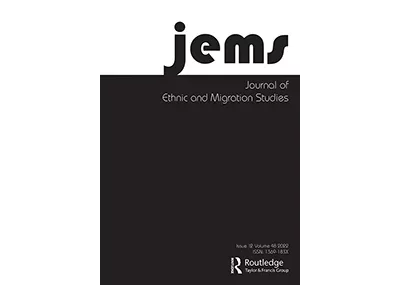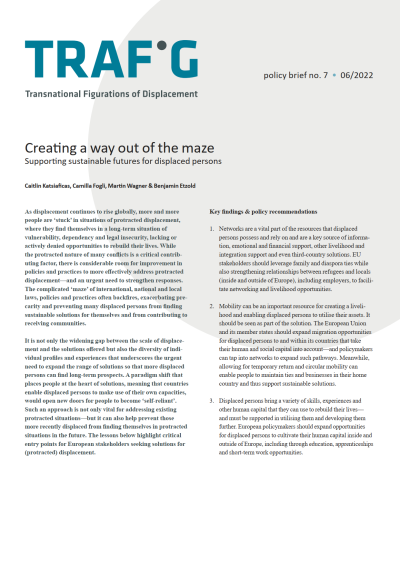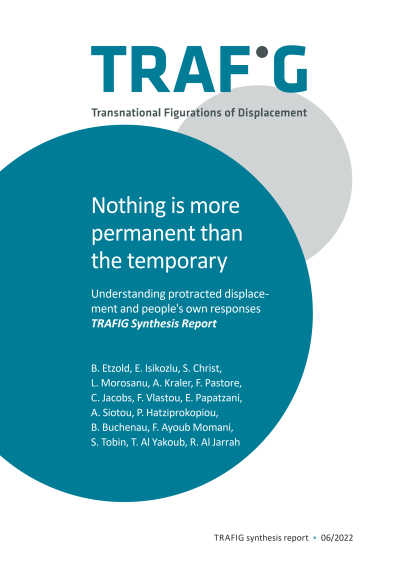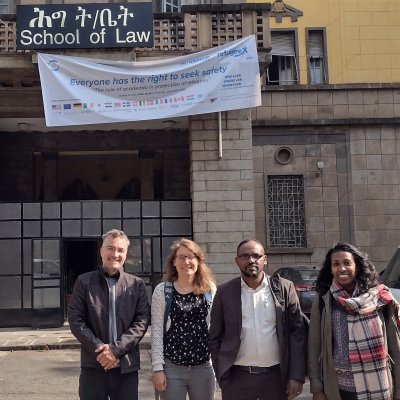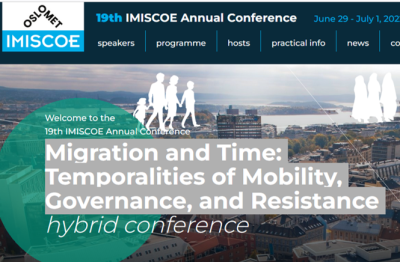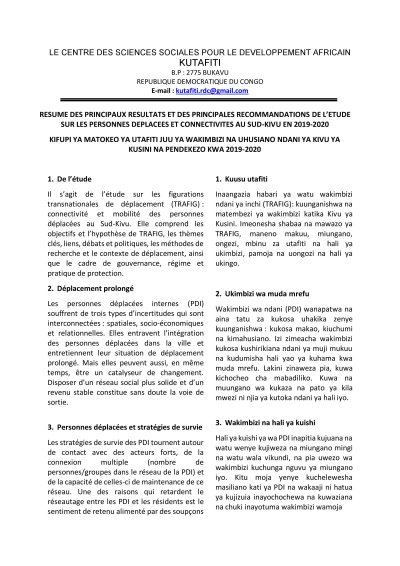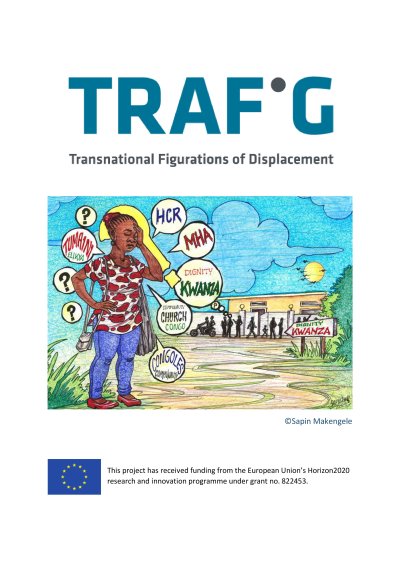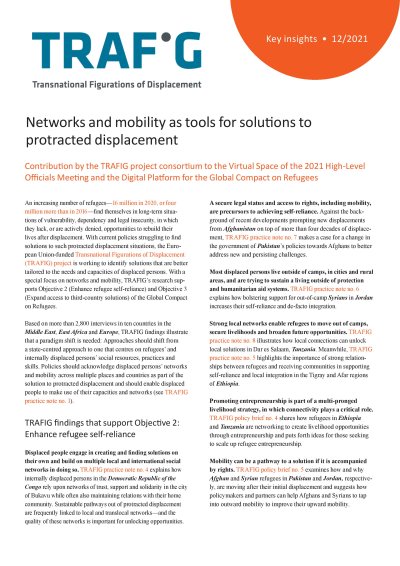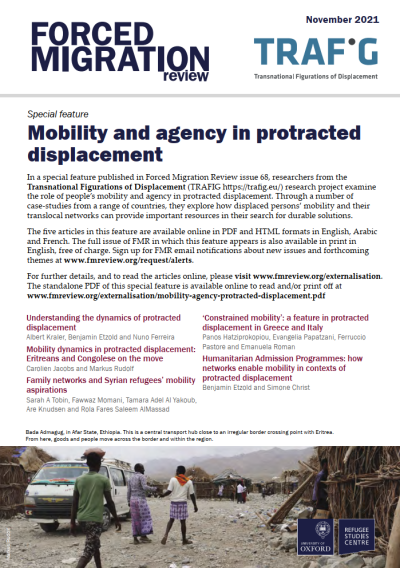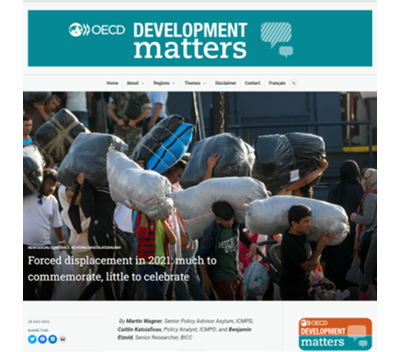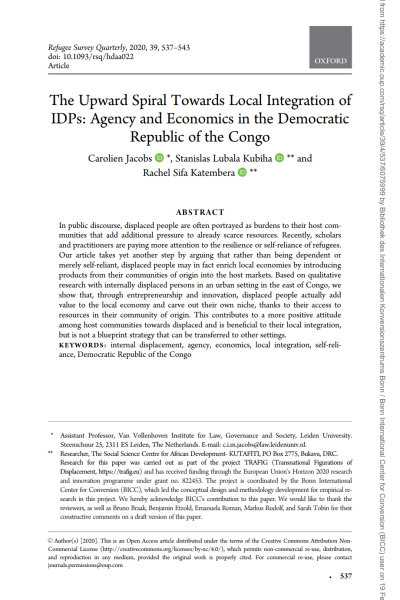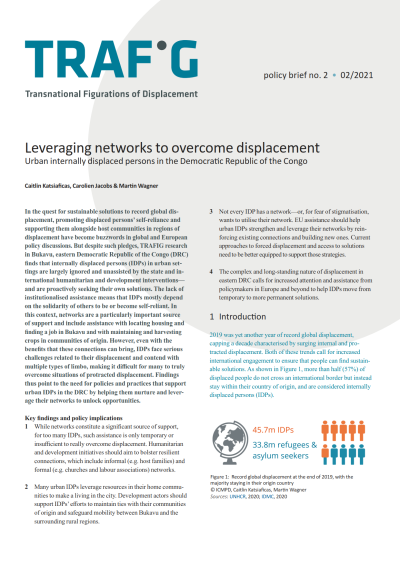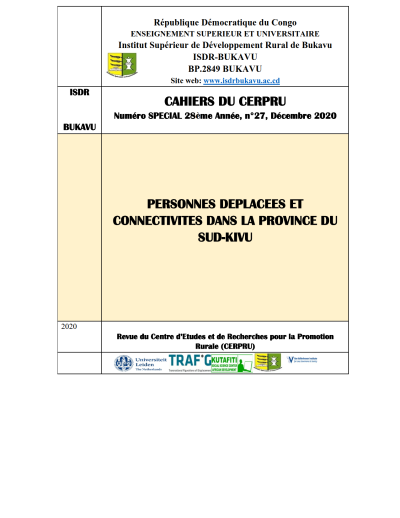Democratic Republic of the Congo
In the DRC, colleagues from Leiden University and the Social Science Centre for African Development (KUTAFITI) jointly carried out research on internal displacement and the network connections of IDPs living in Bukavu, South Kivu. In total, 500 people participated in their study.
Special Issue in JEMS
Unsettling Protracted Displacement: Connectivity and Mobility beyond Limbo
Key results and reflections from the TRAFIG project have just been published in a special issue in the Journal of Ethnic and Migration Studies (JEMS).
The 9 contributions present novel insights of empirical research in African, Asian and European countries on the role of connectivity and mobility in the lives of displaced people, they critically engage with policies, legal frameworks and structures that keep displaced people in an ongoing state of limbo, they reflect upon the concept of protracted displacement and seek to advance its understanding, and they employ a figurational approach in their analysis.
All 9 articles are freely accessible via the publishers website: Read more
1 Introduction: Unsettling Protr
...TRAFIG practice note no. 12
In the shoes of a Congolese refugee:
Online game helps to understand urban refugees' legal struggles
The TRAFIG team developed an interactive story-based online simulation to sensitise practitioners and the public to the multiple challenges urban refugees in Dar es Salaam face. Feedback workshops with refugees, government officials and other local stakeholders in Tanzania and with scholars and students in the Netherlands helped to refine the game and draw key lessons from the method.
TRAFIG practice note no. 12 presents the online game and the lessons learned from three feedback workshops. You can download it here.
More information on the game is available in our TRAFIG toolkit section.
Authors: Janemary Ruhundwa (Dignity Kwanza), Jochem Scheelings (Leiden University / Value... Read more
TRAFIG policy brief no. 7
Creating a way out of the maze: Supporting sustainable futures for displaced persons
As displacement continues to rise globally, more and more people are ‘stuck’ in situations of protracted displacement, where they find themselves in a long-term situation of vulnerability, dependency and legal insecurity, lacking or actively denied opportunities to rebuild their lives. Drawing lessons from more than 3 years of research, this policy brief highlights critical entry points for European stakeholders seeking solutions for (protracted) displacement. Read more
TRAFIG Synthesis report
'Nothing is more permanent than the temporary' – Understanding protracted displacement and people's own responses
Final report sums up findings of 3 1/2 years of TRAFIG research.
Across the world, 16 million refugees and an unknown number of internally displaced persons (IDPs) experience long-lasting conditions of economic precarity, marginalization, rightlessness and future uncertainty. They live under conditions of protracted displacement. Policy solutions often fail to recognise displaced people’s needs and limit rather than widen the range of available solutions.
This report brings together the central findings of the TRAFIG project’s empirical study in the Democratic Republic of the Congo (DRC), Ethiopia, Tanzania, Jordan, Pakistan, Greece, Italy and Germany. We... Read more
Researchers' meetings and outreach activities in Ethiopia
Around Refugee Week 2022, TRAFIG researchers met in Addis Ababa, Ethiopia, to compare and discuss insights from empirial research and to disseminate key research findings to various stakeholders.
On 23 June, the Faculty of Law of Addis Ababa University organized a conference in the framework of World Refugee Week. The conference ‘Everyone has the right to seek safety - The role of academia in the protection of refugees’ was attended by policy makers, practitioners, academics, and refugees. Fekadu Adugna and Markus Rudolf presented key findings of their joint TRAFIG research in Ethiopia. (see the conference program)
From 22-24 June, TRAFIG team members Fekadu Tufa, Mulu Getachew and Desalegn Amsalu (AAU, Ethiopia), Markus Rudolf (BICC) and Carolien Jacobs (Leiden University) organiz... Read more
TRAFIG @ IMISCOE 2022
Presentations of TRAFIG colleagues at the 19th IMISCOE conference
From 29th June - 1st July, the European network of migration researchers IMISCOE will hold its (hybrid) conference in Oslo (more here).
The conference theme "Migration and Time: Temporalities of Mobility, Governance, and Resistance" fits very well to the interests and foci of our TRAFIG project. 'Protracted displacement' can indeed be understood as a social phenomenon that is shaped by quite specific spatial and temporal politics. While movements of refugees and IDPs can hardly be prevented, governments of (potential) receiving states try to manage displaced populations though particular spatial strategies (border enforcement, encampment, etc.) and through temporal strategies (short-term humanitarian support, mid-te... Read more
Internal displacement and network connections in the DRC: Findings and Recommendations
Résumé des principaux resultats et des principales recommendations de l'étude sur les personnes déplacées et connectivites au Sud-Kivu en 2019-2020 / Kifupi ya matokeo ya utafiti juu ya wakimbizi na uhusiano ndani ya Kivu ya Kusini na pendekezo kwa 2019-2020
In French and Swahili
This document provides a short introduction in both French and Swahili of the special issue on protracted displacement in the DRC's South Kivu region and Internally Displaced Persons’ network connections that has been published by TRAFIG’s Congo team. We provide a short description of each of the articles, which relate to TRAFIG’s five main themes. The work is based on our research in and around Bukavu, in the east of the Democratic Republic of Congo. At the end of the document we provide some recommend... Read more
In the shoes of a Congolese refugee / Workshop at Leiden University
On 14 March 2022, TRAFIG partner organisation Leiden University will organise a workshop (in person) about findings from the TRAFIG research on displacement in Tanzania and the Democratic Republic of Congo, which was conducted together with DIGNITY Kwanza and KUTAFITI as local partners. Next to the presentation and discussion of findings, the workshop will be used to present and play the game "the DIGNITY Kwanza method", which was developed in the context of TRAFIG and is based on the stories of Congolese urban refugees living in Dar es Salaam.
Find out more about the workshop and the game here.
Details:
When? Monday, 14 March, 14-16.00h, followed by drinks
Where? Leiden Law School, Steenschuur 25, room B0.31
By whom? Jochem Scheelings (former MA African Studies)... Read more
Networks and mobility as tools for solutions to protracted displacement
Contribution by the TRAFIG project consortium to the Virtual Space of the 2021 High-Level Officials Meeting and the Digital Platform for the Global Compact on Refugees
An increasing number of refugees – 16 million in 2020, or 4 million more than in 2016 – find themselves in long-term situations of vulnerability, dependency and legal insecurity, in which they lack, or are actively denied, opportunities to rebuild their lives after displacement. With current policies struggling to find solutions to such protracted displacement situations, TRAFIG is working to identify solutions that are better tailored to the needs and capacities of displaced persons. With a special focus on networks and mobility, TRAFIG’s research supports Objective 2 (Enhance refugee self-reliance) and Objective 3 (... Read more
Mobility and agency in protracted displacement
Available in English, French and Arabic
The latest issue of the Forced Migration Review includes a special feature on mobility and agency for those living in protracted displacement, produced in collaboration with the TRAFIG project. Read more
- Understanding the dynamics of protracted displacement
- Mobility dynamics in protracted displacement: Eritreans and Congolese on the move
- Family networks and Syrian refugees’ mobility aspirations
- ‘Constrained mobility’: a feature in protracted displacement in Greece and Italy
- Humanitarian Admission Programmes: how networks enable mobility in contexts of protracted displacement
TRAFIG Practice Note No. 4 now available in French
TRAFIG Practice Note No. 4, focussing on resilient connections in the Democratic Republic of the Congo, is now available in French: TRAFIG Note Pratique No. 4: "Renforcer les connexions résilientes en République Démocratique du Congo".
Find out more here.
Forced displacement in 2021: much to commemorate, little to celebrate
Published in the OECD Blog series 'Development matters'
It is primarily the responsibility of states to provide durable solutions to people in protracted displacement. A state-centred approach, however, risk underestimating or even disregarding the ambitions and capacities of displaced people themselves. In a contribution to the OECD blog series ‘Development matters’ Martin Wagner and Caitlin Katsiaficas (both ICMPD) and Benjamin Etzold (BICC) present some insights on TRAFIG research on the mobility of displaced people in the Middle East and East Africa and the role of networks in their everyday lives. They conclude that many refugees rely first and foremost on their own human, social and financial capital to build a more secure future.
Find the article here: Forced displaceme... Read more
The Upward Spiral Towards Local Integration of IDPs: Agency and Economics in the Democratic Republic of the Congo
An article by Carolien Jacobs, Stanislas Lubala Kubiha and Rachel Sifa Katemberain in Refugee Survey Quarterly, 2020, 39.
In public discourse, displaced people are often portrayed as burdens to their host communities that add additional pressure to already scarce resources. Recently, scholars and practitioners are paying more attention to the resilience or self-reliance of refugees. Our article takes yet another step by arguing that rather than being dependent or merely self-reliant, displaced people may in fact enrich local economies by introducing products from their communities of origin into the host markets. Based on qualitative research with internally displaced persons in an urban setting in the east of Congo, we show that, through entrepreneurship and innovation, displaced people... Read more
TRAFIG policy brief no. 2
Leveraging networks to overcome displacement
Urban internally displaced persons in the Democratic Republic of the Congo
In the quest for sustainable solutions to record global displacement, promoting displaced persons’ self-reliance and supporting them alongside host communities in regions of displacement have become buzzwords in global and European policy discussions. But despite such pledges, TRAFIG research in Bukavu, eastern Democratic Republic of the Congo (DRC) finds that internally displaced persons (IDPs) in urban settings are largely ignored and unassisted by the state and international humanitarian and development interventions—and are proactively seeking their own solutions. The lack of institutionalised assistance means that IDPs mostly depend on the solidarity of others to... Read more
Personnes déplacées et connectivites dans la province du Sud-Kivu
The Rural Development Institute in Bukavu (Institut Supérieur de Développement Rural de Bukavu, ISDR-Bukavu) in the DR Congo has published a special issue on protracted displacement in Congo’s South Kivu region and Internally Displaced Persons’ network connections in its journal ‘Cahiers du CERPRU’. The special issue Personnes déplacées et connectivites dans la province du Sud-Kivu (complete PDF in French) consists of a collection of papers that are written by the researchers of TRAFIG’s Congo team, and which follow TRAFIG’s five main themes. Their findings are enriched by four life histories of displaced persons. The special issue is further complemented with two articles by Congolese researchers working on related topics. The papers are based on research that was carried out in and a... Read more

